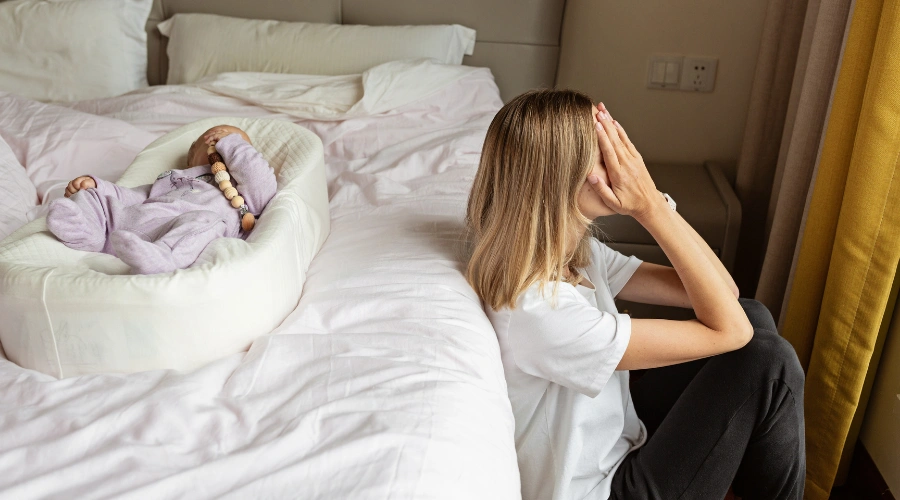Overcoming SAHM Syndrome And Finding Treatment
Many will tell you that being a stay-at-home mom is a privilege. Working parents may even go as far to say that you have it easier as a mom who doesn’t work a daily job.
But, behind these carefree smiles and busy schedules filled with extracurricular activities, many stay-at-home moms (SAHMs) find themselves quietly struggling with depression.
This begs the question: where is there to turn when others, even stay-at-home mom friends, make you feel guilty for feeling the way you do?
The reality? Many SAHMs struggle with feelings of isolation, exhaustion, and depression. Being available for your kids 24/7 takes a toll. This doesn’t mean you don’t love them or feel blessed, but still, you feel guilty that you aren’t doing enough.
And we understand: it can be easy to lose yourself when your days revolve around managing your entire household.
If you’ve found yourself drained, unseen, or stuck in a cycle of caring for others, but never yourself, Stay at Home Mom syndrome may be to blame. This resource from Catalina will tell you what warning signs to watch for and when you should reach out for help.
Get Confidential Depression and PTSD Assessment – Call Now!
How is Stay-at-Home-Mom Syndrome Defined?
SAHM syndrome isn’t an official diagnosis, but it is a label that can describe what you’re going through. Caring for your children full-time has unique emotional and mental health struggles.
You may feel overwhelmed or exhausted after a long day of managing the demands of childcare, housework, and possibly your partner.
Often, stay-at-home moms aren’t recognized for their contribution, either. Without recognition or outside support, it’s all too easy to feel stuck, leading to depression, anxiety, or other mental health issues.
Depressive Disorders vs Mom Burnout
Many stay-at-home moms experience burnout. Mom burnout comes from temporary stress. It improves with rest, support, and self-care. But, how do you know what you are experiencing is more than typical burnout? Depressive symptoms are deeper than feeling exhausted. It becomes harder to follow through with daily responsibilities, and the things you once enjoyed are no longer interesting. Hopelessness, sleep issues, and appetite problems are also common.
Sometimes, burnout is the warning sign that happens before stay-at-home mom depression. Left unchecked, burnout spirals into depression, and your mental well-being sharply declines. Working with a mental health professional may be necessary for healing once you reach this stage.
Why is Stay-at-Home Mom Depression So Common?

Have you ever felt like most parents don’t understand the challenges that you go through as a stay-at-home mom? Hours spent on childcare and household tasks aren’t always appreciated. Moms are on call for their children 24/7, tend to their spouses at night, and are never fully “off the clock”.
When you’re available to anyone who needs you 24/7, it’s hard to rest properly, eat well, or even shower. You might isolate yourself from others because you’re always busy, and maintaining friendships takes time.
Stay-at-home moms also usually feel undervalued. Work in the house goes unpaid and sometimes, overlooked by even your partner. Even social media can make the thoughts you’re having worse, as picture-perfect families show a filtered life. You may feel guilty that your home/life doesn’t look like what you see online.
Managing Life Can Be Overwhelming
Stay-at-home moms are the “default parent”, which goes beyond cooking and cleaning up after children. Your kids look to you if they get hurt or need help. They rely on you to manage school and sports schedules, take them to appointments, and keep the household finances in order. It’s exhausting to manage all this on your own, especially when you don’t have time to rest.
If you feel it’s hard to maintain the balance as a SAHM, you aren’t alone. Many stay-at-home moms struggle with balancing being their own person and being a caretaker. As you set your own needs to the side, stress keeps building. It makes struggling with mental disorders like anxiety and depression much more likely.
It’s Easy to Overlook Your Own Self-Care
Have you ever missed a meal because you were too busy getting the kids ready for school or chauffeuring them to sports? Or, have you skipped a shower because when you finally found time, you were just too exhausted? You aren’t alone. Many stay-at-home moms put their family’s needs above their own, but that doesn’t make it right.
Remember that prioritizing your health is a big thing that you can do for your kids. It puts you in the best mindset for caring for them. Some self-care is also a great reminder that you are also important.
Isolation and Lack of Adult Interaction

Being a full-time caregiver means less time for yourself. You may struggle to talk on the phone with kids screaming in the background, let alone get out of the house for a coffee date to catch up. This can leave you in the house for hours (or longer) without meaningful adult conversation.
The loneliness and isolation that stay-at-home moms feel only make depressive symptoms worse. You miss out on opportunities to vent, and there’s little validation that your feelings are normal. Once depression rears its ugly head, it’s especially hard to heal without this support.
Loss of Your Sense of Self
Motherhood changes everything, but for SAHMs, it can become all-consuming. You can lose yourself without a career or role outside the home, particularly if your partner isn’t coming home and giving you a break from the kids.
Many stay-at-home moms lose sight of who they are while raising children. This loss of identity feeds depression, especially as your own hobbies, passions, and goals are pushed to the back burner as you rise to meet your family’s needs.
Unrealistic Expectations on Social Media
Social media can provide you with a sense of community, but it can also make you feel like you aren’t doing enough. Remember that behind those picture-perfect posts, others’ lives are just as chaotic.
You can only see things through a filter on social media, and it should never be used as a measure of whether or not you are failing. Don’t allow these unrealistic versions of motherhood to make you feel guilty, inadequate, or depressed.
Get Accredited Treatment Programs at Catalina
SAHM Moms vs Working Moms: Different Challenges, Same Struggles
It doesn’t matter if you are a stay-at-home mom, working mom, or part-time mom, the world will still make you feel as if you’re doing enough. Even working moms battle with guilt, and both groups struggle with depression. The struggles are just a little different.
As a stay-at-home mom, you might find isolation and loss of your identity are the biggest problems. Working moms might hate being away from their children or struggle to balance career demands and family needs.
For some stay-at-home mothers, part-time employment can help bridge this gap. It gives you an opportunity to exist outside of being a caretaker. However, it’s not practical for every family. And, not all stay-at-home moms find fulfillment through working part-time.
No matter what role you find yourself in, you deserve empathy and support. The right support gives you room to heal, so you can become the best version of yourself for your family.
When to Consider Professional Help for Depression as a Mom

Are your symptoms starting to make it hard to function? Have symptoms like low mood, difficulty concentrating, mood swings, and exhaustion lasted for longer than two weeks? These symptoms can be overwhelming when you’re living with them, and it’s also a good sign to get help.
Other signs to watch for are feeling detached from your children, struggling with food and sleep, and loss of interest in things you once enjoyed. Stay-at-home mom depression is very real and interferes with everyday life. Talk to a mental health professional sooner, before your symptoms spiral out of control.
Treatment Options for SAHM Depression
Many moms have dealt with SAHM depression, but that doesn’t mean that every path to healing looks the same. Often, the best results occur from combining several treatment approaches.
Therapy
Therapy is a safe space to vent outside of your friend group, where you may feel judged or misunderstood. Then you can work with your therapist on tools to manage these struggles. Dialectical Behavior Therapy (DBT) and Cognitive Behavioral Therapy (CBT) are two approaches commonly used to help moms challenge negative thought patterns and build healthier coping strategies.
Medication
Medication can also be used as part of recovery. An antidepressant boosts mood and reduces symptoms. It becomes easier to stick to your treatment plan and show up for your kids. Medication can be used temporarily or as part of a longer-term solution, depending on your specific needs. Medication should be personalized and closely monitored by a qualified psychiatric professional.
Group Support

Online or in-person support groups can make stay-at-home moms feel less alone. It can feel comforting to share your experiences with fellow parents who understand your struggles. It can also help reduce isolation and build a sense of community.
Lifestyle Changes
When you shift your daily routine, big changes in your mood follow. Sleeping enough, adding exercise, eating well, and even just making a little time for yourself all support mental health.
Lifestyle changes aren’t necessarily a cure-all, but they do support your mood and mental health. This approach works especially well when combined with professional treatment.
Up To 100% of Rehab Costs Covered By Insurance
Find Compassionate Support for Your Mental Health at Catalina
Stay-at-home mom depression is real, and it doesn’t mean that you love your children any less.
It’s a sign that you’ve dedicated yourself to your household so fully that you’ve pushed your own needs aside. The best thing that you can do is reach out, so you can become the best version of yourself again.
At Catalina Behavioral Health, we work closely with moms who share your same struggles so that you don’t have to carry the burden of SAHM depression alone.
Call us confidentially today to start talking about the next steps to take toward becoming the healed, better version of yourself that lets you show up fully for yourself (and your family).
References
- https://adaa.org/understanding-anxiety/depression
- https://www.nimh.nih.gov/health/topics/caring-for-your-mental-health





